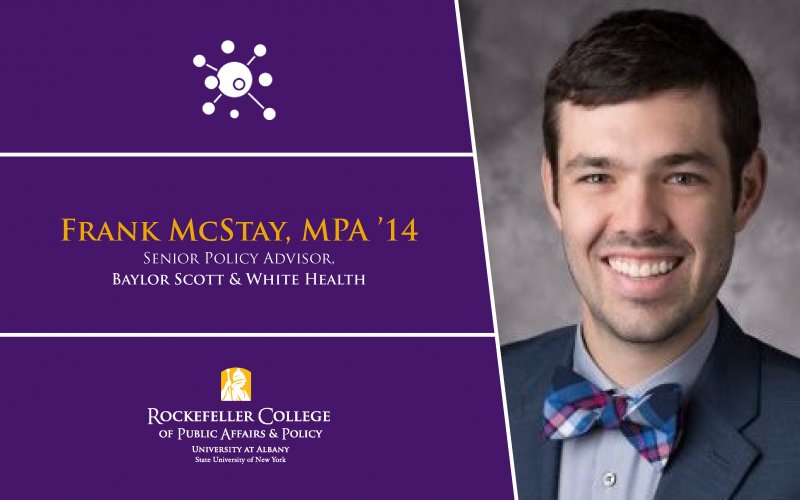COVID-19 Response: Frank McStay, MPA ’14

Frank McStay is a Senior Policy Advisor for Baylor Scott and White Health in Texas. Prior to working for BSWH, Frank was a senior researcher for the Brookings Institution and Duke University in Washington D.C. At these organizations, he engaged with government health officials, physician societies, and other health care researchers. McStay has also held positions with the New York State Association of Health Care Providers, Department of Defense and Office of the Attorney General of Texas.
Frank earned a Master's of Public Administration in Analytic Methods and Health Policy from the University at Albany’s Rockefeller College of Public Affairs & Policy in 2014.
When the COVID-19 virus hit the United States, Frank’s job responsibilities were greatly affected by the pandemic. Frank explains In the Q&A below:
Tell us about your role at Baylor Scott and White.
When I joined Baylor Scott and White almost four years ago, I had three main duties. One of which was policy and quantitative research, so I was performing economic analyses for different health care programs, like our telemedicine programs. I was also doing legislative and regulatory analysis — I'm the principal analyst for the system — so whenever the Centers for Medicare & Medicaid Services (CMS), the United States Department of Health and Human Services (HHS), or State of Texas put out regulations for hospitals and clinics, I'm the first one they go to. I do the first pass in terms of analyzing the regulations for impact to our system, and then distribute the regulations to different parts of our organization and write the comment letters.
The third thing I do, besides research, regulations and legislation, is a little bit of strategic and operational consulting. We have a lot of different arms at Baylor Scott and White — we're the largest nonprofit healthcare system in Texas, have approximately 55 different hospitals, about 1,000 different clinics, 8,000 physicians, 50,000 employees, and $13 billion in revenue every year. I work across each of departments to assist in the implementation of health policy, as well as planning for future health policy needs.
HOW HAS YOUR DAY-TO-DAY JOB CHANGED AMID COVID-19 CONCERNS?
When COVID started in January, I wasn't involved at that point. It wasn't until mid February when we realized what was going to happen that we developed our non-medical operational teams and at that point it was clear that the government was going to be shifting a significant amount of policy. So, my first role in COVID response was primarily as a regulatory analyst. I worked with legal and compliance to keep track of the well over 100 different regulatory and statutory waivers put out by Congress, CMS or HHS, and the State of Texas. We provided our hospitals, physician-offices, clinicians, labs, and others operational guidance about what the expanded flexibility the government was providing them.
The second big bucket of work I do now is analysis of the various federal stimulus bills Congress has passed. I'm the primary analyst for these bills, so it’s my job to “be in the weeds” so to say and understand the nuances of each bill. I then help set up the different operational teams to capture some of those stimulus dollars, even going so far as to actually put together the applications for some of the funding. For example, I'm the lead for our FCC telehealth grant, so I am interacting with the FCC, putting together the different application elements, collaborating with our research institute, and also working with our legal department to make sure that we're properly registered. Indeed, I actually wrote a significant portion of the grant itself that explained what we're using the money for in telehealth, the populations we serve, and showing them the cost invoices and related information.
It has been very long days and weeks — 12, 14 hour days, six or even seven days a week. It's a lot.
HOW DO YOU THINK YOUR EDUCATION HELPED PREPARE YOU FOR THE WORK YOU ARE CURRENTLY DOING?
Rockefeller College gave me confidence and practical skills I need to have an influence on the health care system. It's a small school that I really think of as a learning community, where the faculty, staff, and students can openly engage in rigorous in-depth dialogues about current critical topics. It prepared me exceedingly well to continue to learn even after school, so I can continue to be at the top of my field.
WHAT IS ONE PIECE OF ADVICE YOU WOULD SHARE WITH CURRENT STUDENTS INTERESTED IN PURSUING A CAREER LIKE YOURS?
Don’t be afraid of making mistakes and ask a lot of questions. Own your mistakes and don’t let them deter you from pursuing more challenging projects.
Also, you better love what you do. And I think that is especially true for COVID right now. It's not fun to work 14 hour days for several weeks in a row. It’s not fun, unless you love what you do and you know you are having an impact. You better have a voracious appetite to acquire new knowledge because in times like COVID, it is like drinking from a fire hose.
More practically, take quantitative classes. Whether it be financial analysis or doing some type of population health modeling, you have to be comfortable with numbers. In the end, don't panic, have confidence in yourself, and work hard.


